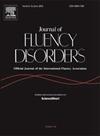Exploring employers’ beliefs, reactions, and knowledge regarding people who stutter
IF 2.1
3区 医学
Q1 AUDIOLOGY & SPEECH-LANGUAGE PATHOLOGY
引用次数: 0
Abstract
Purpose
Vocational role entrapment and employment disparities have been well documented in adults who stutter. Employers’ understanding of and attitudes toward stuttering may contribute, at least, in part, to these inequities. The primary purpose of this study was to expand prior research by exploring employers’ beliefs, reactions, and knowledge regarding people who stutter. A secondary purpose was to determine the influence of age, gender, racial and ethnic background, and/or familiarity with a person who stutters on employers’ attitudes (i.e., beliefs and reactions).
Method
A sample of 331 employers from the six largest employment sectors in the U.S. participated in the study. To assess knowledge and attitudes toward stuttering, respondents completed the Public Opinion Survey of Human Attributes-Stuttering (POSHA-S; St. Louis, 2011). Responses were analyzed using descriptive statistics and multiple linear regression.
Results
Most employers reported knowing nothing to very little about stuttering. Additionally, many were unsure about the veracity of common stuttering stereotypes relating to personality traits and etiology. Race and ethnicity, gender, and familiarity with a person who stutters were significant predictors of employers’ attitudes toward people who stutter.
Conclusion
Employers’ misunderstandings of stuttering may perpetuate ableism and contribute to employment disparities impacting adults who stutter. Findings reveal a critical need for education and training for hiring professionals in the United States.
探索雇主对口吃者的看法、反应和了解
目的:在口吃的成年人中,职业角色陷阱和就业差异已经得到了很好的证明。雇主对口吃的理解和态度可能至少在一定程度上造成了这些不平等。本研究的主要目的是通过探索雇主对口吃者的信念、反应和知识来扩展先前的研究。第二个目的是确定年龄、性别、种族和民族背景和/或对口吃者的熟悉程度对雇主态度(即信念和反应)的影响。方法来自美国六大就业部门的331名雇主参与了这项研究。为了评估被调查者对口吃的认识和态度,他们完成了《人类属性-口吃公众意见调查》(POSHA-S;圣路易斯,2011)。采用描述性统计和多元线性回归对反应进行分析。结果大多数雇主表示对口吃一无所知或知之甚少。此外,许多人不确定与人格特征和病因有关的常见口吃刻板印象的真实性。种族、民族、性别和对口吃者的熟悉程度是雇主对口吃者态度的重要预测因素。结论用人单位对口吃的误解可能导致残疾歧视的持续存在,并导致成年口吃者就业差异的产生。调查结果显示,美国急需对招聘专业人员进行教育和培训。
本文章由计算机程序翻译,如有差异,请以英文原文为准。
求助全文
约1分钟内获得全文
求助全文
来源期刊

Journal of Fluency Disorders
AUDIOLOGY & SPEECH-LANGUAGE PATHOLOGY-REHABILITATION
CiteScore
3.70
自引率
14.30%
发文量
23
审稿时长
>12 weeks
期刊介绍:
Journal of Fluency Disorders provides comprehensive coverage of clinical, experimental, and theoretical aspects of stuttering, including the latest remediation techniques. As the official journal of the International Fluency Association, the journal features full-length research and clinical reports; methodological, theoretical and philosophical articles; reviews; short communications and much more – all readily accessible and tailored to the needs of the professional.
 求助内容:
求助内容: 应助结果提醒方式:
应助结果提醒方式:


